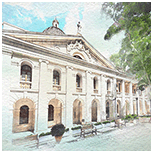Review of 2022
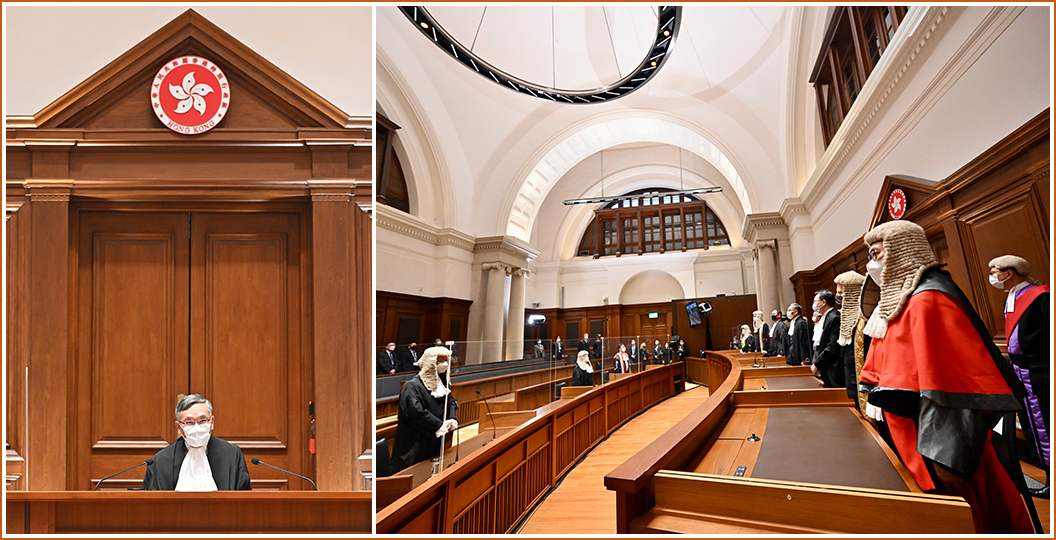
At the Ceremonial Opening of the Legal Year on 24 January, the Hon Chief Justice Andrew CHEUNG indicated that this was an important occasion which focused public attention on the administration of justice and the rule of law. It also reminded our community of the essential role played by an independent judiciary in the continued success of Hong Kong under the “One Country, Two Systems” arrangement.
The Hon Chief Justice Andrew CHEUNG remarked that Hong Kong was a society governed by the rule of law and the judicial independence in Hong Kong was constitutionally guaranteed by the Basic Law. He highlighted that our court hearings were open to the public, our judicial decisions were publicly announced, and the courts’ reasons were published for everyone to study. He stressed that judicial independence in Hong Kong existed as a fact.
The Hon Chief Justice Andrew CHEUNG remarked that, apart from the setting up of an enhanced mechanism on handling complaints against judicial conduct in 2021, the Judiciary had reviewed the Guide to Judicial Conduct, which was first published in 2004. He believed that the new edition of the Guide, which was soon to be published, would continue to assist judges to maintain the highest standards of judicial conduct, and give the public a better understanding of our judicial work and the uncompromised standards we set for ourselves.
The Hon Chief Justice Andrew CHEUNG assured the community that our judges at all levels of court were committed day in, day out to the practical administration of the law. He indicated that further judicial appointments would be made to different levels of court to provide manpower relief. He also outlined the measures that would be taken to improve judicial efficiency and provided an update on the Judiciary’s efforts in improving court facilities and making greater use of technology to support and facilitate the conduct of court business.
►Appointment of Judges and Judicial Officers
Various judicial appointments took effect in the year of 2022.
The Hon Madam Justice Carlye CHU Fun-ling, Justice of Appeal of the Court of Appeal of the High Court, was appointed as a Vice-President of the Court of Appeal of the High Court on 1 November 2022.
Ms Yvonne CHENG Wai-sum, SC, was appointed as a Judge of the Court of First Instance of the High Court on 5 January 2022.
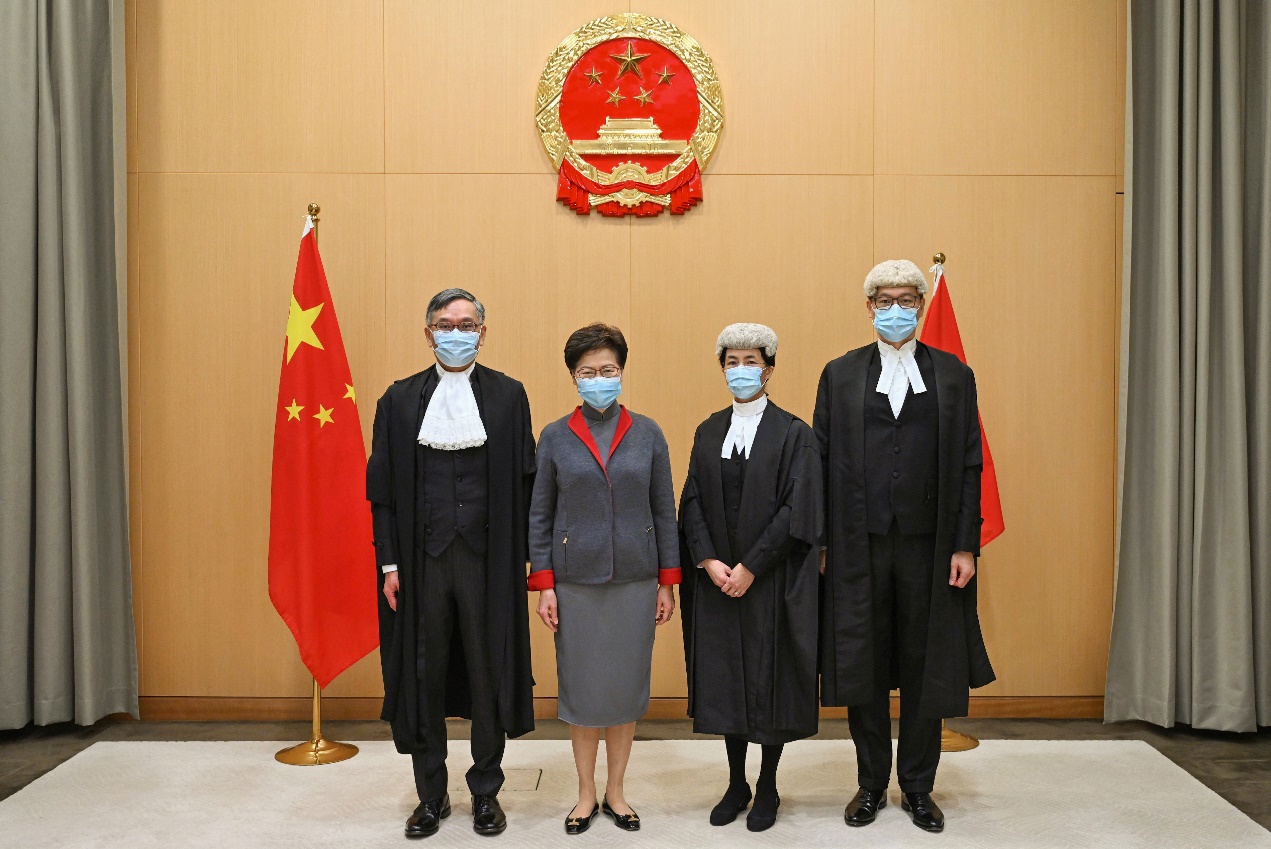 Appointment of Ms Yvonne CHENG Wai-sum, SC, (second right) as a Judge of the Court of First Instance of the High Court
Appointment of Ms Yvonne CHENG Wai-sum, SC, (second right) as a Judge of the Court of First Instance of the High Court Ms WONG Sze-lai, Permanent Magistrate, was appointed as a District Judge on 15 March 2022.
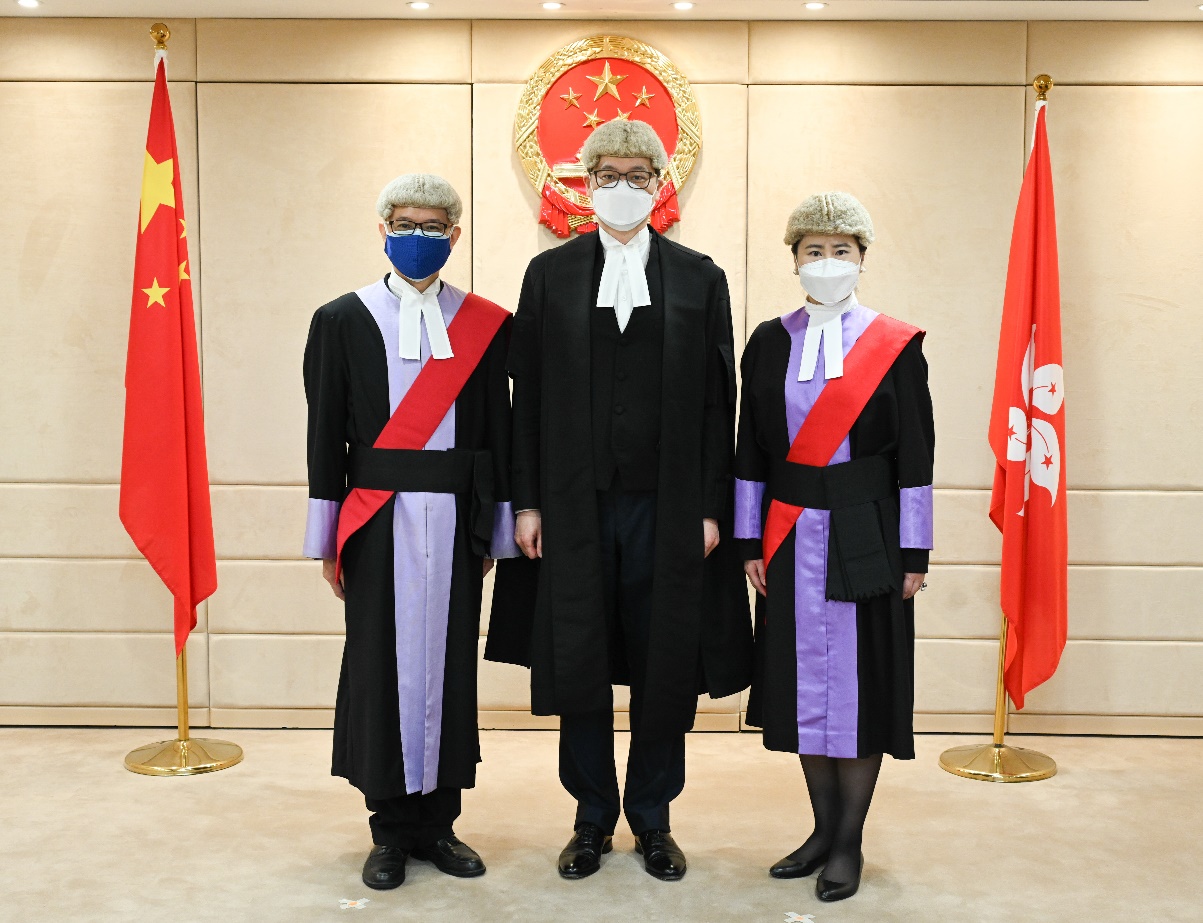 Appointment of Ms WONG Sze-lai (first right), Permanent Magistrate, as a District Judge
Appointment of Ms WONG Sze-lai (first right), Permanent Magistrate, as a District Judge Ms CHEUNG Kit-yee, Permanent Magistrate, was appointed as a District Judge on 14 April 2022.
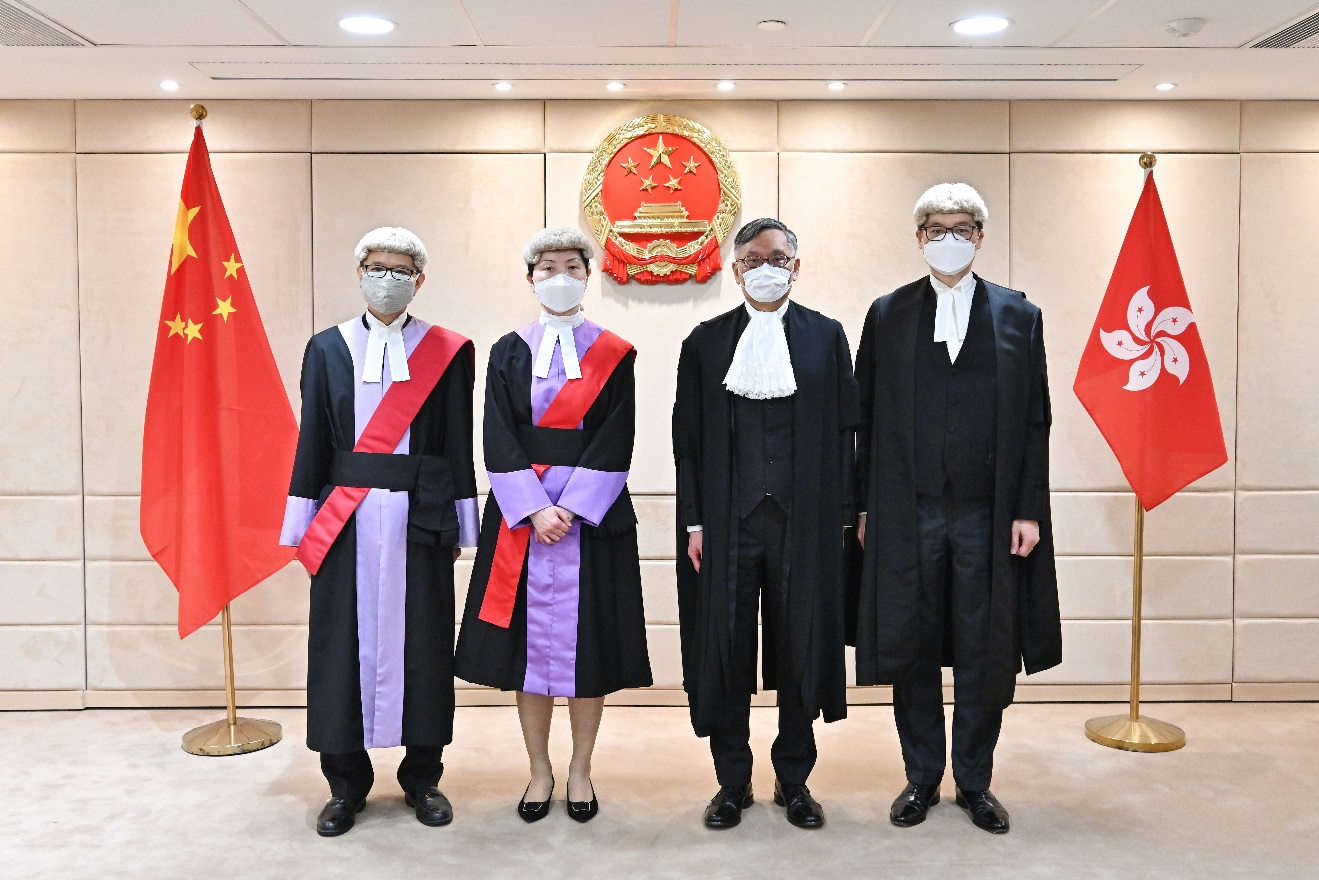 Appointment of Ms CHEUNG Kit-yee (second left), Permanent Magistrate, as a District Judge
Appointment of Ms CHEUNG Kit-yee (second left), Permanent Magistrate, as a District Judge Ms Thelma KWAN Tin-man was appointed as a District Judge on 1 June 2022.
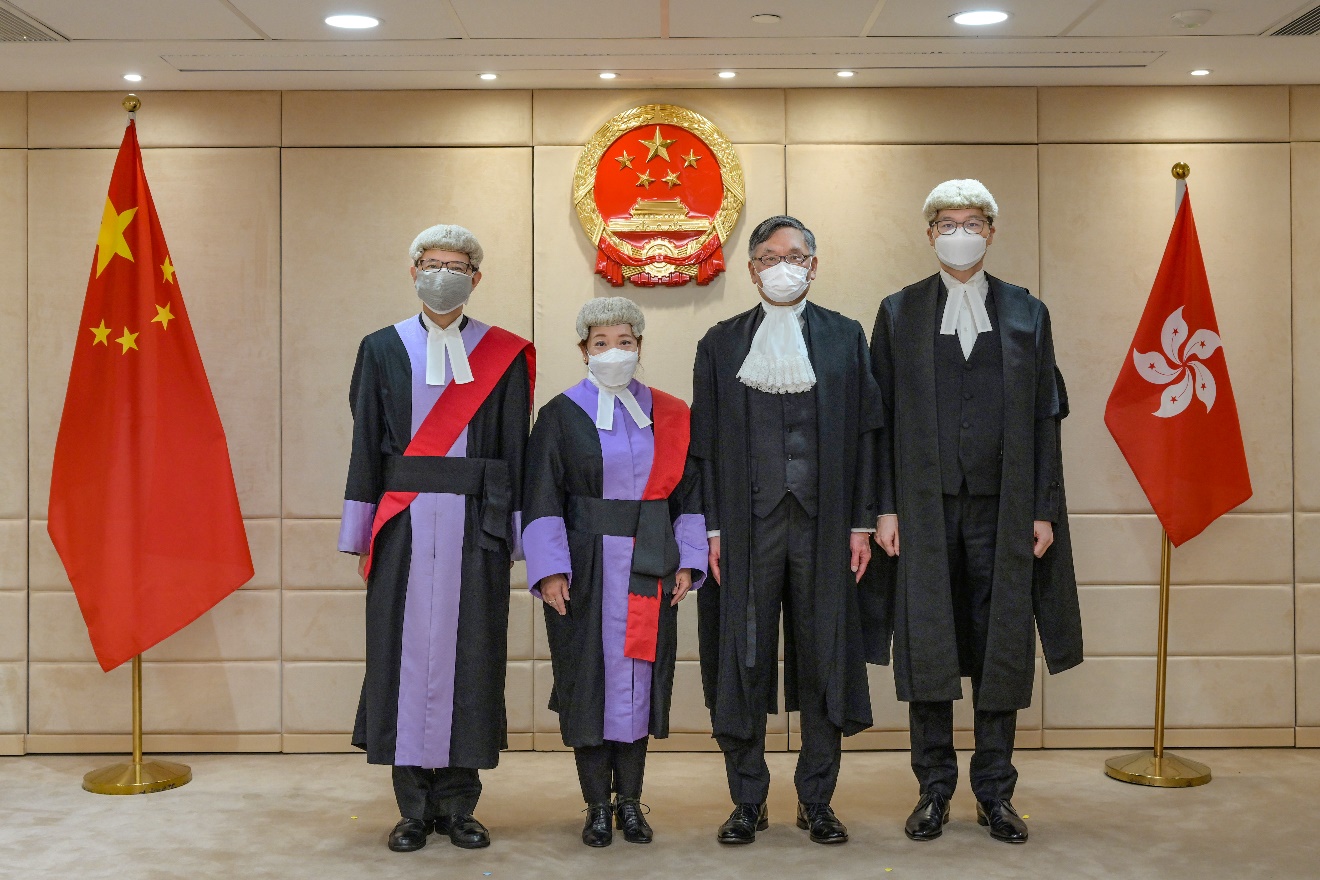 Appointment of Ms Thelma KWAN Tin-man (second left) as a District Judge
Appointment of Ms Thelma KWAN Tin-man (second left) as a District Judge Mr Jonathan WONG was appointed as a District Judge on 11 July 2022.
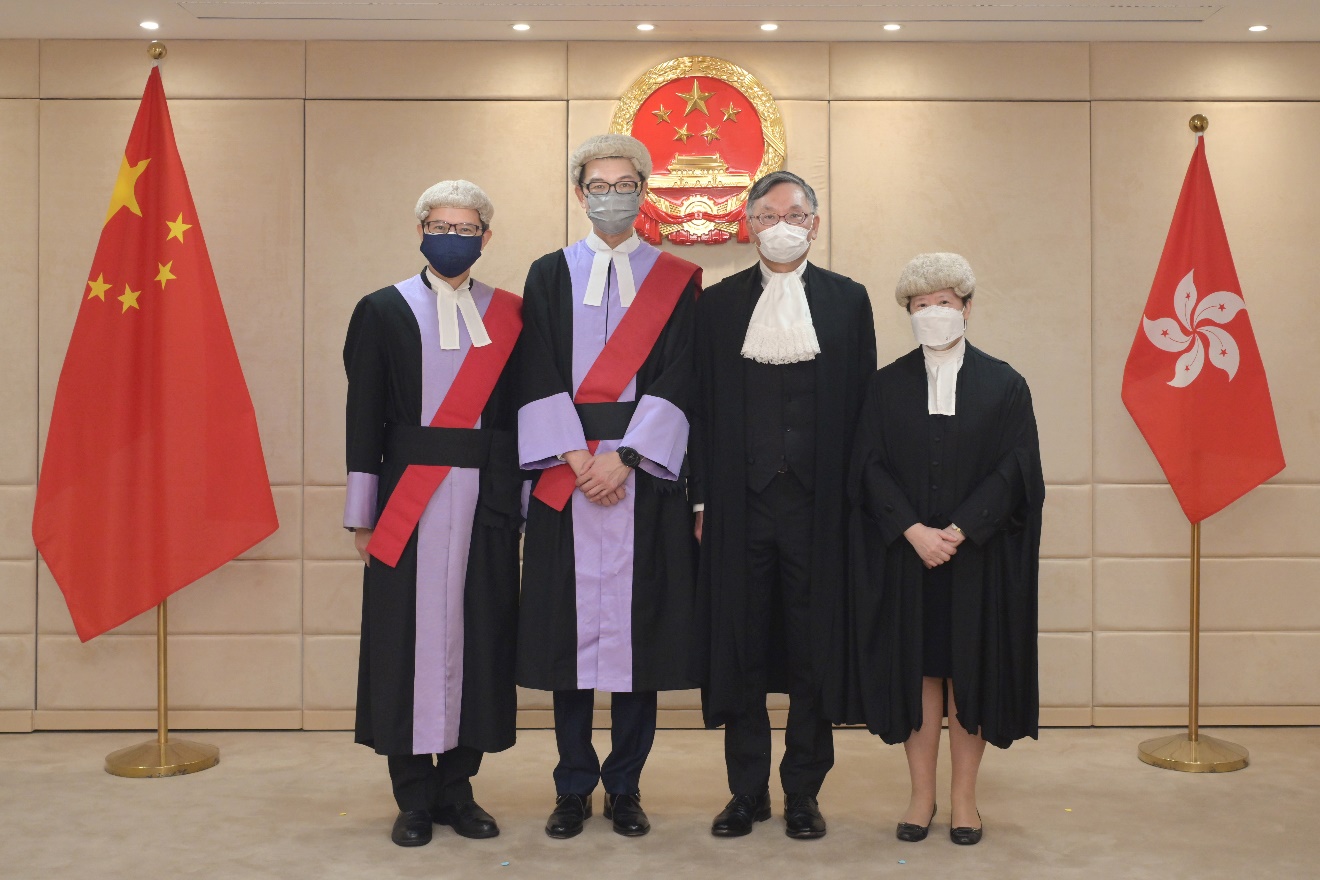 Appointment of Mr Jonathan WONG (second left) as a District Judge
Appointment of Mr Jonathan WONG (second left) as a District Judge Ms Elaine LIU Yuk-ling was appointed as a District Judge on 29 July 2022.
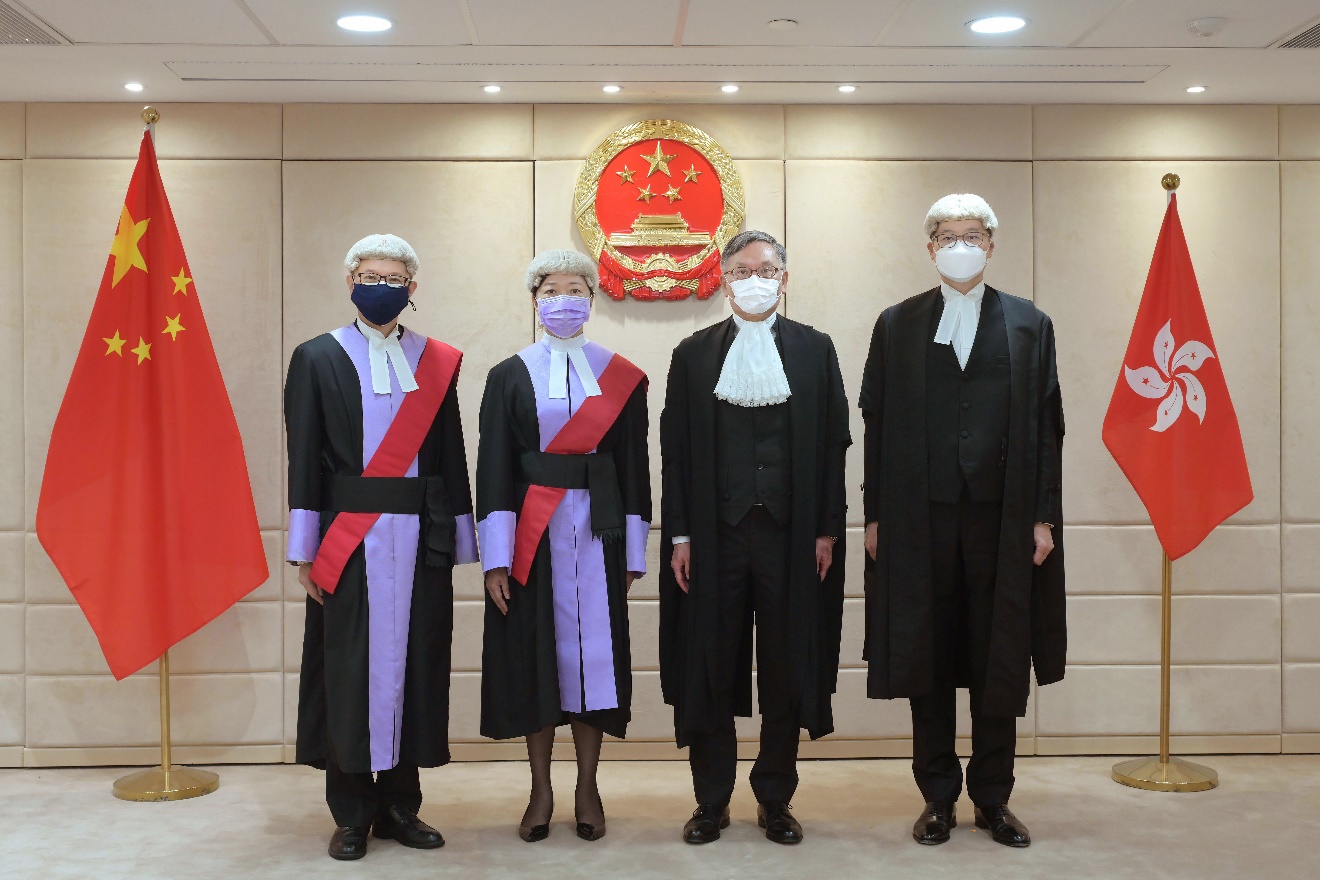 Appointment of Ms Elaine LIU Yuk-ling (second left) as a District Judge
Appointment of Ms Elaine LIU Yuk-ling (second left) as a District Judge Ms Charmaine LO Hong-wai and Ms Vivian HO Wai-han were appointed as Permanent Magistrates on 15 August 2022.
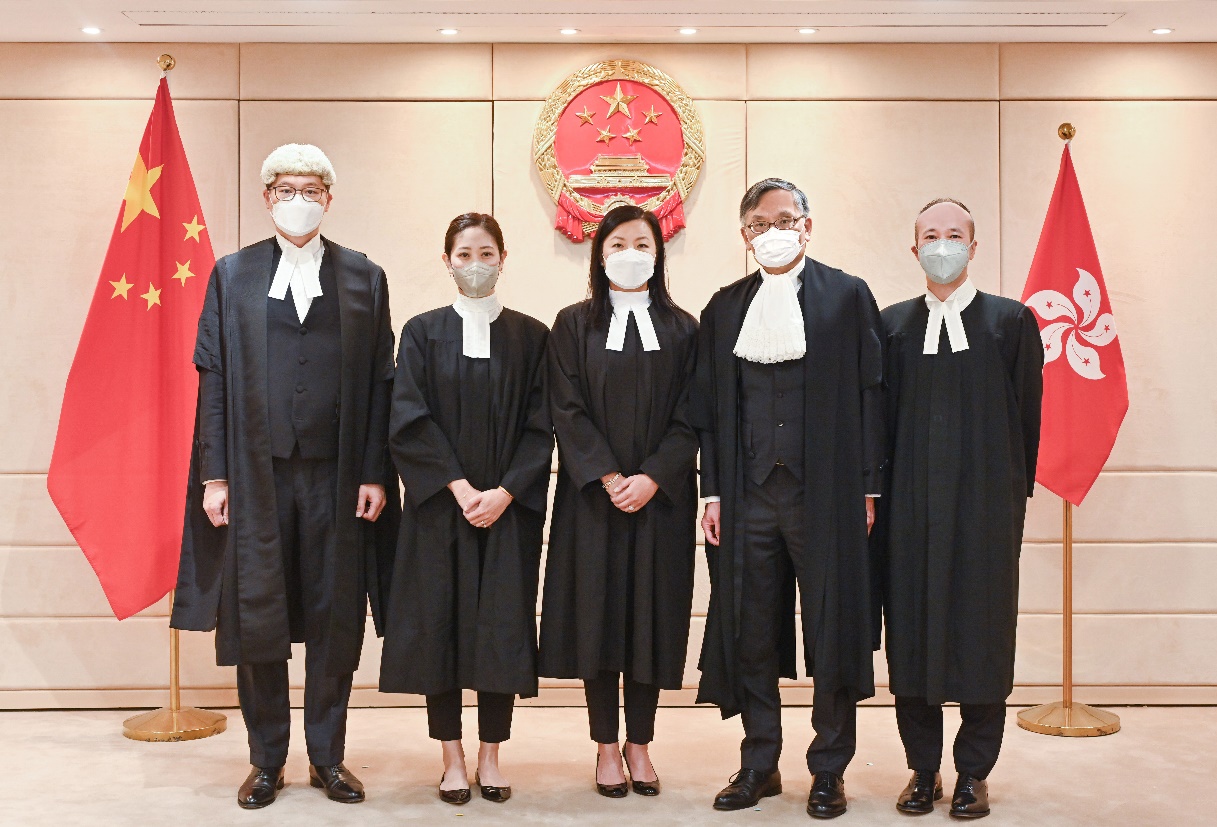 Appointment of Ms Charmaine LO Hong-wai (second left) and Ms Vivian HO Wai-han (centre) as Permanent Magistrates
Appointment of Ms Charmaine LO Hong-wai (second left) and Ms Vivian HO Wai-han (centre) as Permanent Magistrates Mr Philip CHAN Chee-fai and Mr TSANG Chung-yiu were appointed as Permanent Magistrates on 14 October 2022.
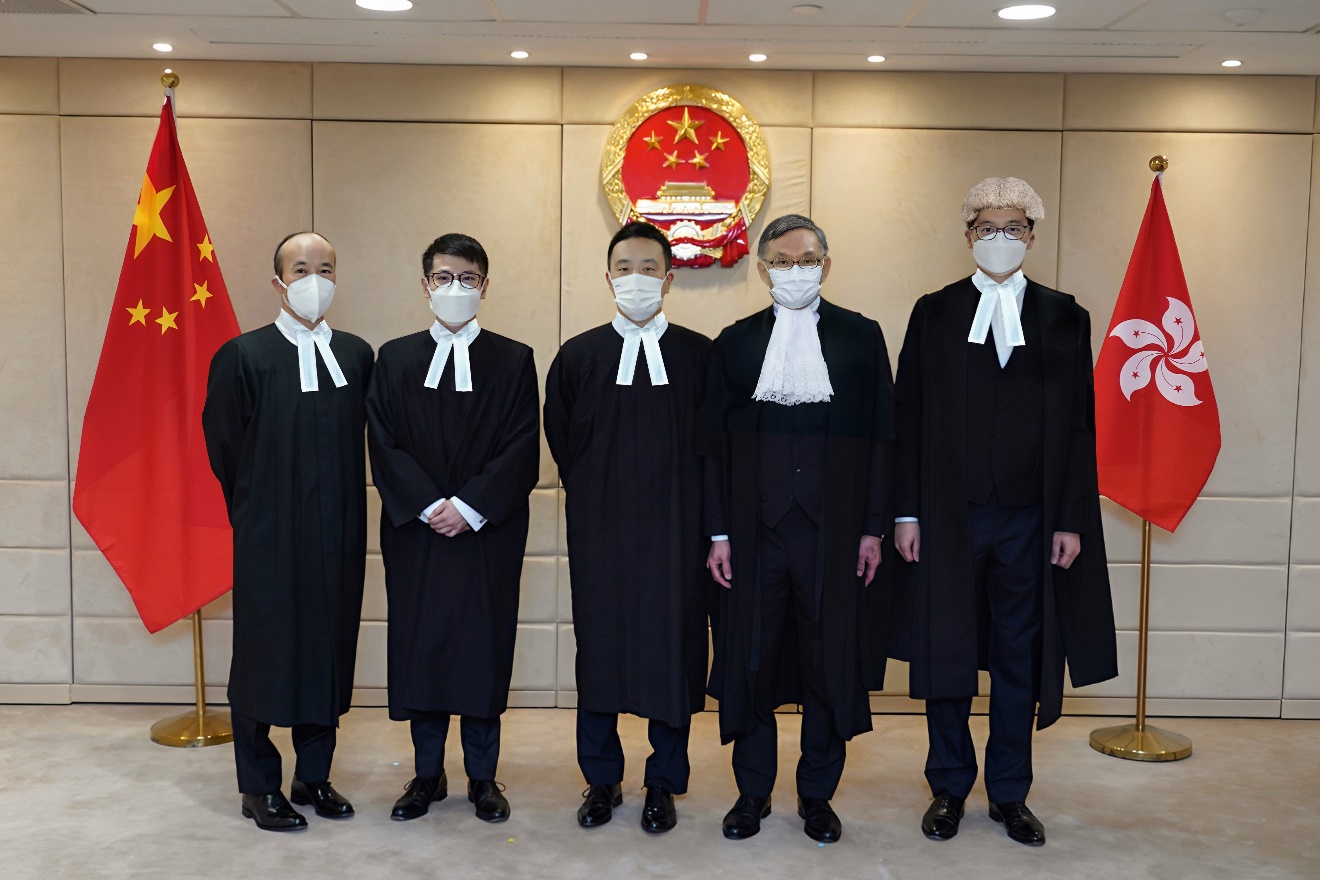 Appointment of Mr Philip CHAN Chee-fai (centre) and Mr TSANG Chung-yiu (second left) as Permanent Magistrates
Appointment of Mr Philip CHAN Chee-fai (centre) and Mr TSANG Chung-yiu (second left) as Permanent Magistrates Miss Vivian LEE Wai-wan was appointed as a Permanent Magistrate on 15 November 2022.
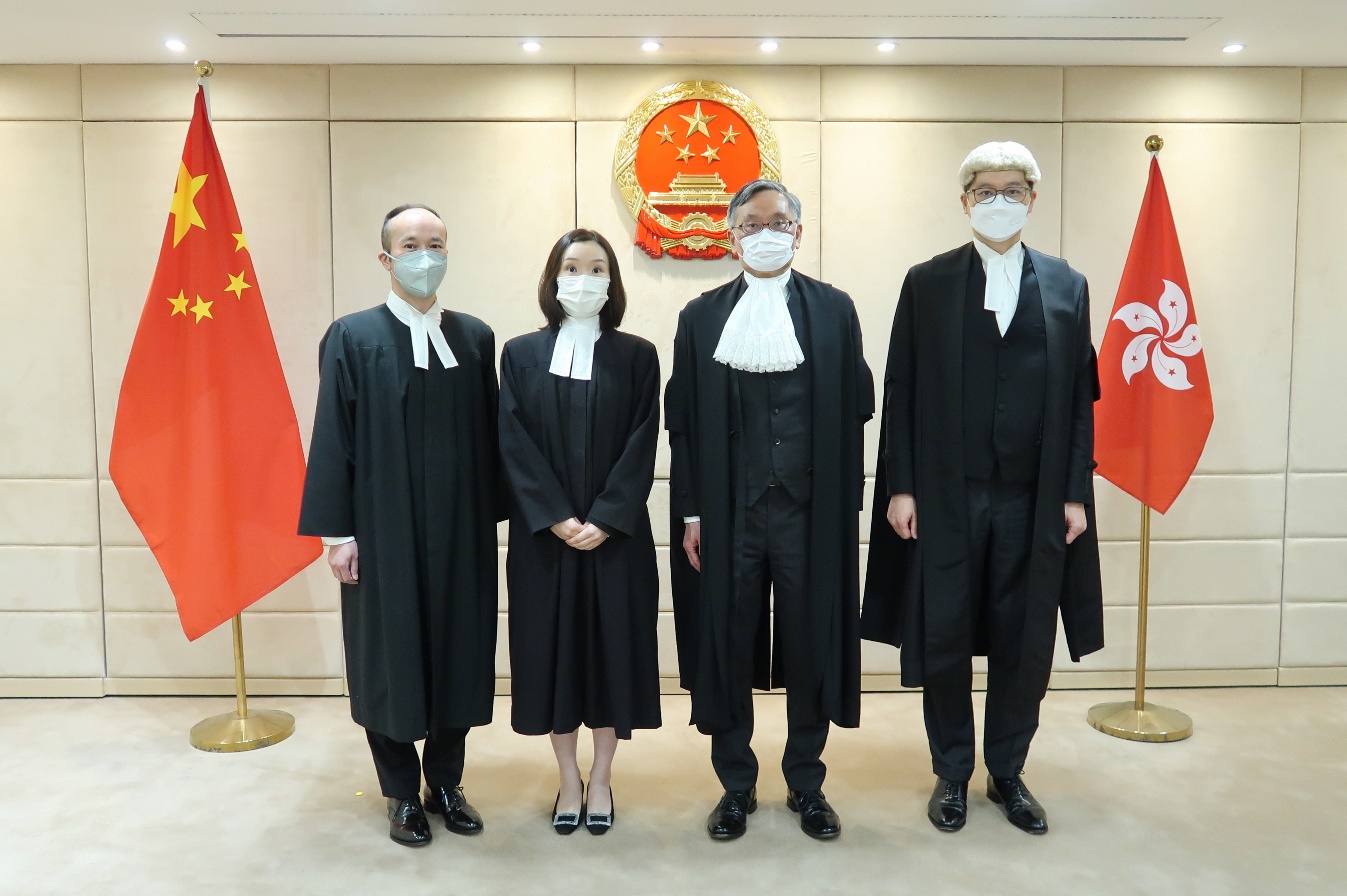 Appointment of Miss Vivian LEE Wai-wan (second left) as a Permanent Magistrate
Appointment of Miss Vivian LEE Wai-wan (second left) as a Permanent Magistrate Mr Dick HO Chin-pang, Principal Magistrate, was appointed as a District Judge on 6 December 2022.
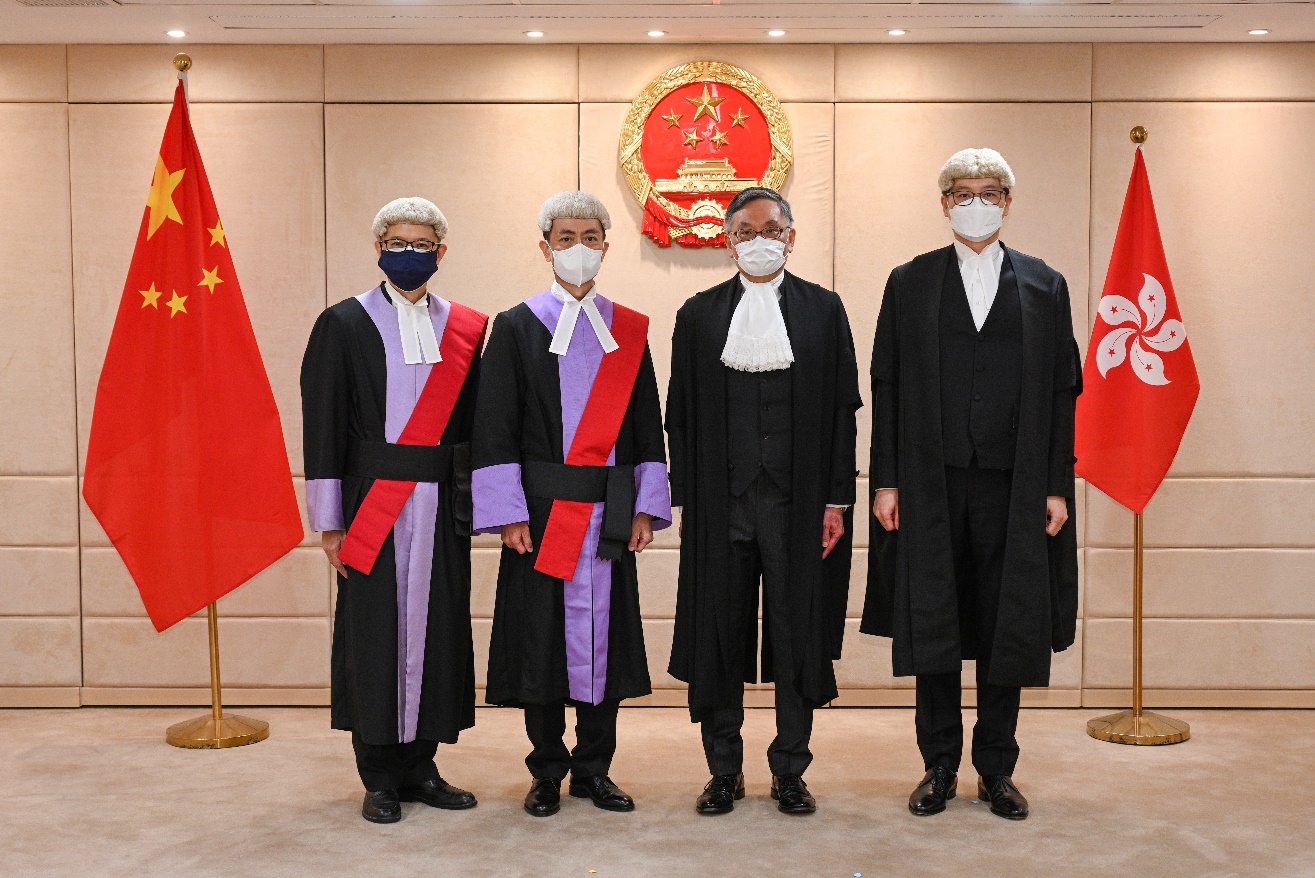 Appointment of Mr Dick HO Chin-pang (second left), Principal Magistrate, as a District Judge
Appointment of Mr Dick HO Chin-pang (second left), Principal Magistrate, as a District Judge Mr TSANG Hing-tung, Mr Gary CHU Man-hon and Mr LI Ngai were appointed as Permanent Magistrates on 15 December 2022.
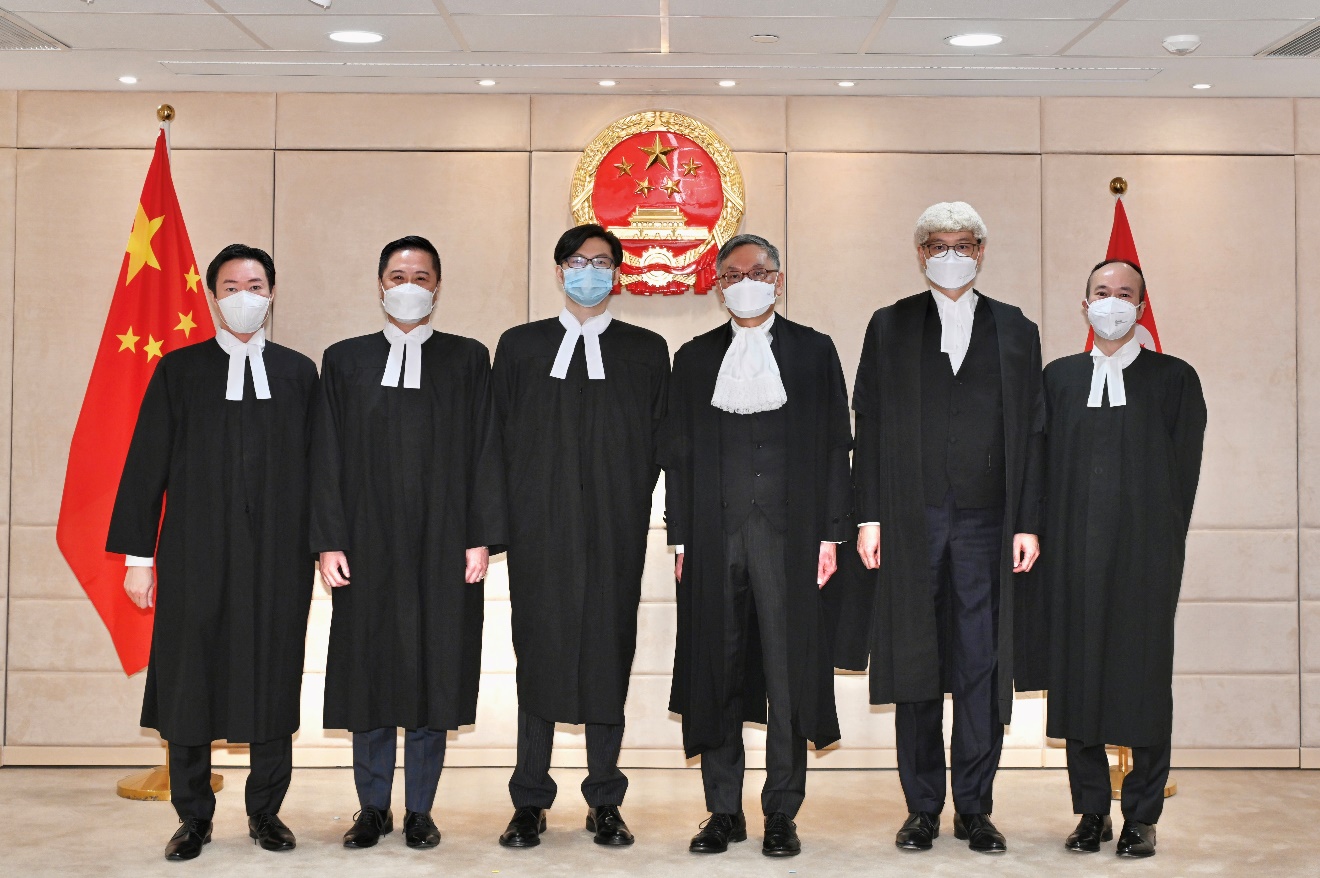 Appointment of Mr TSANG Hing-tung (second left), Mr Gary CHU Man-hon (first left) and Mr LI Ngai (third left) as Permanent Magistrates
Appointment of Mr TSANG Hing-tung (second left), Mr Gary CHU Man-hon (first left) and Mr LI Ngai (third left) as Permanent Magistrates ►Review of the Guide to Judicial Conduct
In May 2022, the Judiciary published the 2022 Guide to Judicial Conduct (“the Guide”), an update to the 2004 edition. The Guide has been revised to take into account the impact of the advancement in information technology, particularly the use of social media in the daily life. The guidance on recusal and apparent bias has also been updated with reference to recent case law in this area. General principles on handling cases involving public controversies, as well as guidance on behaviour in court and making comments on parties and other persons when performing judicial functions are also included.
The Guide will continue to provide useful guidance to judges and judicial officers in maintaining the highest standards of judicial conduct, and enable the public to better understand our judicial work and the uncompromised standards we set for ourselves.
The Guide can be downloaded from the Judiciary's website.
►Judicial training
In 2022, our judges and judicial officers continued to participate in various judicial training activities organised by the Hong Kong Judicial Institute and webinars organised by other organisations. Starting from 2021, the Hong Kong Judicial Institute organised a series of seminars on Chinese law to strengthen understanding of the legal and judicial system of the Mainland. The third seminar on the continuation and development of the HKSAR’s legal system and the mutual legal assistance arrangements between the Mainland and the HKSAR was conducted in September 2022.
►Conference of Chief Justices of Asia and the Pacific
The Judiciary hosted the 18th Conference of Chief Justices of Asia and the Pacific on 16 and 17 November 2022. The conference is a biennial event which provides the Chief Justices from Asia and the Pacific region with a forum to discuss various issues of common interest to judiciaries. It was the second time Hong Kong was playing host to the conference, the first having been held in 2007. Organised by the Judicial Section of the Law Association for Asia and the Pacific (“LAWASIA”), the conference was held in a virtual mode for the first time. It was attended by 24 Chief Justices and eight representatives of Chief Justices from jurisdictions throughout Asia and the Pacific region. The conference showcased Hong Kong’s close ties with other jurisdictions throughout Asia and the Pacific region.
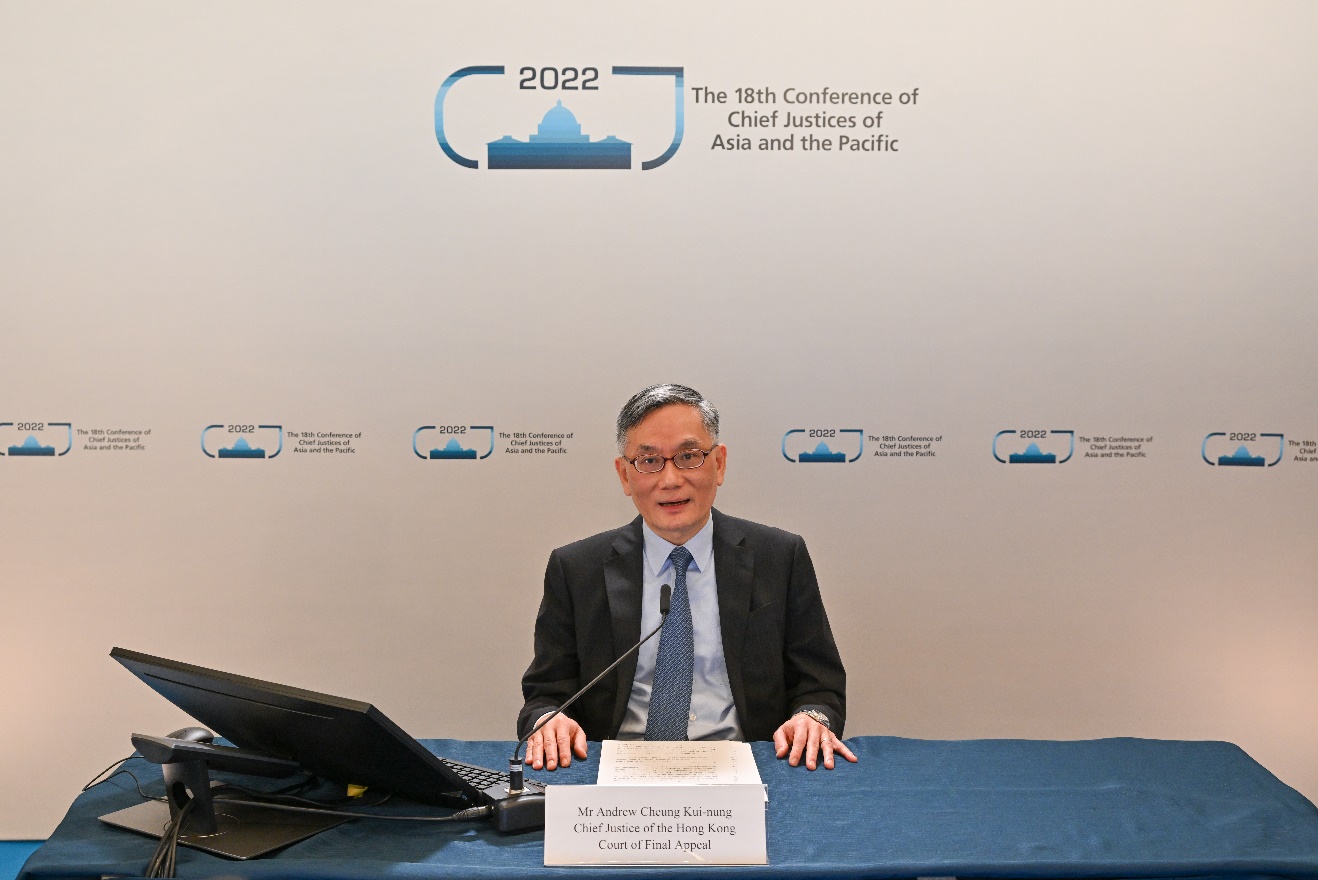 The Hon Chief Justice Andrew CHEUNG delivered opening remarks at the opening ceremony of the 18th Conference of Chief Justices of Asia and the Pacific via video-conferencing
The Hon Chief Justice Andrew CHEUNG delivered opening remarks at the opening ceremony of the 18th Conference of Chief Justices of Asia and the Pacific via video-conferencing ►Exchanges with other Jurisdictions
In 2022, our judges and judicial officers continued having exchanges with their counterparts in other jurisdictions. However, owing to the COVID-19 pandemic situation, the majority of the exchanges were conducted through on-line video conferencing. A gist of these exchanges is set out below.
In February, the Hon Chief Justice Andrew CHEUNG and the Hon Mr Justice Jeremy POON, Chief Judge of the High Court, attended the 7th Judicial Seminar on Commercial Litigation via video conferencing. The Hon Mr Justice Jonathan Russell HARRIS, the Hon Madam Justice Mimmie CHAN, the Hon Mr Justice Anthony CHAN, the Hon Mr Justice Russell Adam COLEMAN and the Hon Madam Justice Linda CHAN, Judges of the Court of First Instance of the High Court, spoke at the Seminar via video conferencing.
In April, the Hon Chief Justice Andrew CHEUNG delivered opening remarks at the opening ceremony of the Guangdong-Hong Kong-Macao Greater Bay Area Judicial Case Seminar via a pre-recorded video. The Hon Madam Justice Queeny AU-YEUNG, and the Hon Madam Justice Linda CHAN, Judges of the Court of First Instance of the High Court, spoke at different discussion sessions of the seminar. The Hon Madam Justice Linda CHAN also participated in a mock trial session via a pre-recorded video.
In May, the Hon Chief Justice Andrew CHEUNG attended the Forum on Rule of Law in Digital Economy via video conferencing. The Hon Mr Justice Jeremy POON, Chief Judge of the High Court, also spoke at the Forum via video conferencing.
In August, the Hon Chief Justice Andrew CHEUNG attended the Inaugural Meeting of Chief Justice and Judges in charge of Technology hosted by the Supreme Court of Singapore via video conferencing. The Hon Mr Justice Tony POON, Judge of the First Instance of the High Court, also spoke at the Meeting via video conferencing.
In November, the Hon Chief Justice Andrew CHEUNG delivered opening remarks at opening ceremony of the Rule of Law Congress: Rule of Law and Justice for All under Hong Kong Legal Week 2022.
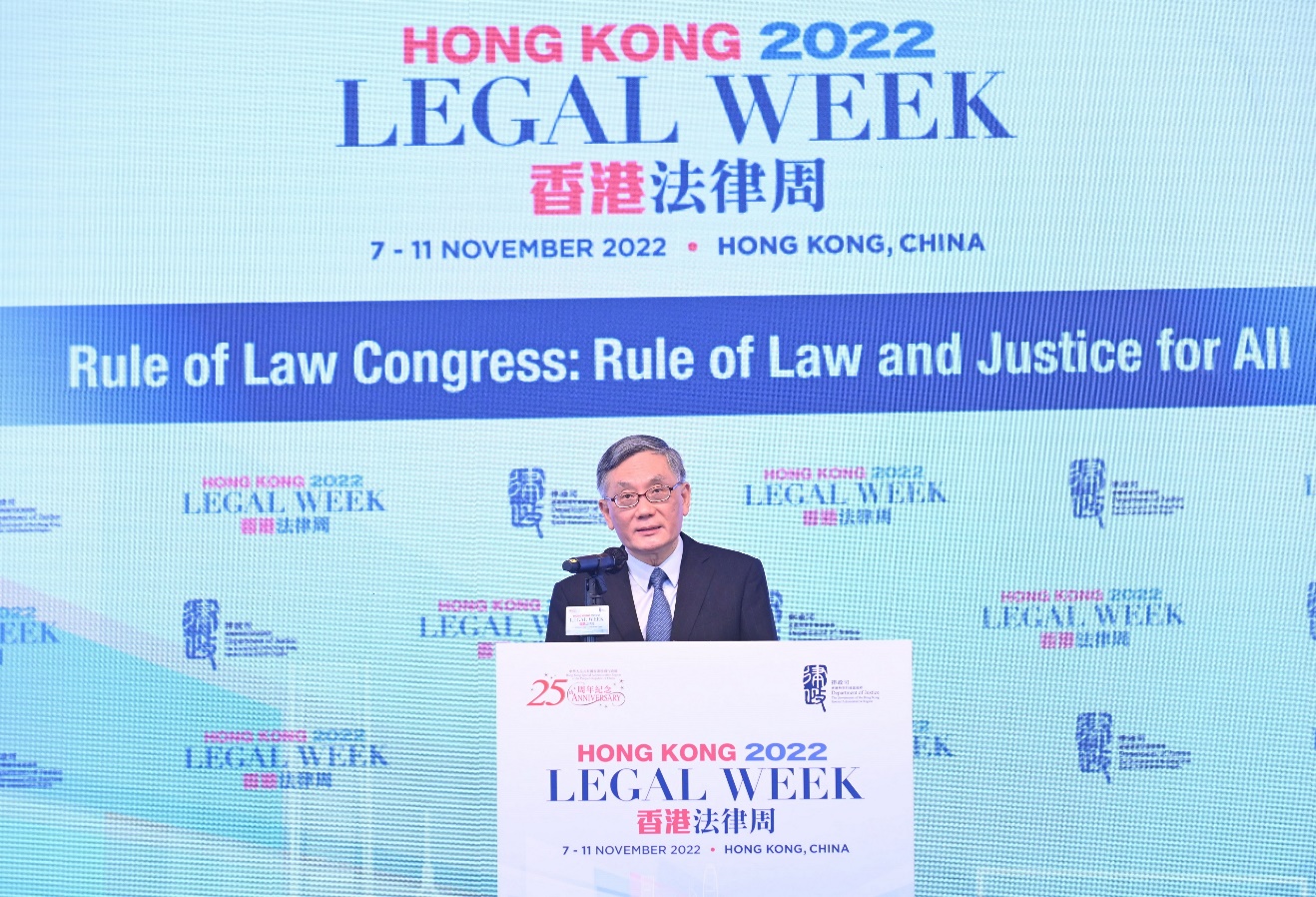 (Photo: Department of Justice)
(Photo: Department of Justice)The Hon Chief Justice Andrew CHEUNG delivered opening remarks at the opening ceremony of the Rule of Law Congress: Rule of Law and Justice for All under Hong Kong Legal Week 2022 on 11 November 2022
►Meeting challenges on workload
In 2022, court operations were fraught with particular challenges from the onset of the 5th wave of the COVID-19 pandemic in the first half of the year which hit hard on manpower supply at all levels of court. Greater adjustments to court capacity (including a one-month general adjournment of proceedings) had to be made as a result when compared with 2021. Apart from the impact of fluctuating public health situation, the need to cope with an increasing number of complicated cases (especially those relating to the social events (“SE”) in 2019 and national security (“NS”)) at various court levels, and the continued influx of leave applications for judicial review on non-refoulement claims and related appeals at the High Court and the Court of Final Appeal, continued to pose substantial challenges to the Judiciary.
The Judiciary has been making pro-active and dedicated efforts in coping with the challenges through a series of measures which seek to make the best possible use of available manpower and court facilities to handle the maximum volume of court business, with priority given to NS and SE cases as appropriate. Such measures include-
| (a) | engagement of additional judicial manpower. The Judiciary has been conducting open recruitment exercises for judges and judicial officers at different levels of court from time to time with a view to maintaining sufficient judicial manpower to meet operational needs. The latest round of recruitment exercises is now in progress; |
| (b) | more pro-active case management for SE and NS cases, including imposing a tight procedural timetable; |
| (c) | longer court sitting hours and Saturday sittings as appropriate; |
| (d) | using alternative means of disposal for civil proceedings (including judicial reviews) such as remote hearings and paper disposal where appropriate; and |
| (e) | enhancing the capacity of courtrooms and providing additional court facilities. |
With such pragmatic efforts, we managed to dispose of workload comparable to that in 2019 before the pandemic and generally achieve the target court waiting times for civil cases in 2022. Priority has continued to be accorded to coping with the complicated cases relating to the SE and NS. The Judiciary has already disposed of some 1 950 (or around 88%) of over 2 220 SE cases and some 130 cases (or around 79%) of about 165 NS cases brought to various levels of court. However, owing to the need to re-schedule cases affected by adjustments to court capacity in light of the evolving public health situation, and the continued influx of SE and NS cases (including many complex cases involving a large number of defendants, legal representatives, large volume of video recordings, and longer trials), the average court waiting times for some case types, mainly criminal cases, have inevitably been affected.
►Enhancement of court facilities and security
The Judiciary continued to work with the Architectural Services Department in 2022 to build a total of seven new courtrooms at the Wanchai Tower and the Revenue Tower, including a mega courtroom which can accommodate as many as 50 defendants, 100 legal representatives and 80 family members or members of the public. These are in addition to six new courtrooms being built at the High Court Building.
As regards court security, the Judiciary put in place security screening for the court floors of the District Court in the Wanchai Law Courts Building in October 2022, in addition to security screening already in operation in the Court of Final Appeal Building and the West Kowloon Law Courts Building, as well as on the court floors of the High Court and the Family Court. As part of our on-going efforts to ensure the safety of judges, judicial officers, Judiciary staff and court users, this measure aims to prevent prohibited items from being brought into court premises. Where practicable and appropriate, the Judiciary would consider introducing security screening to other court premises.
With a large number of cases attracting public and media attention, the Judiciary has been taking appropriate crowd management and security measures, including queuing and ticketing arrangements to ensure fair allocation of seats and orderly admission of court users, CCTV recording to deter unruly behavior as well as proportionate deployment of security manpower for maintaining order and security in court premises. The Judiciary has also updated its advice to court users observing court proceedings to guard against unruly behaviour with a view to ensuring the solemnity and integrity of court proceedings.
►Greater use of technology
The Judiciary has been making on-going efforts to make use of technology to enhance the efficiency of court operations. The impetus was substantially increased following the need for periodic adjustments to court capacity during the COVID-19 pandemic. In 2022, we proceeded at full steam with the implementation of a series of key technology initiatives including e-filing under the Information Technology Strategy Plan (“ITSP”), use of e-bundles at court hearings, remote hearings, e-appointment system as well as digital evidence and exhibits handling system.
Over the past few years, under the ITSP, the Judiciary has been developing by phases an integrated Court Case Management System (“iCMS”) across all levels of court for handling court-related documents and payments through an electronic mode. The iCMS has been implemented in the District Court and the Magistrates’ Courts respectively from May and December 2022. So far, the electronic mode can be used for Personal Injuries Action, Tax Claim, Civil Action and Employees’ Compensation Case of the District Court, and summons cases of the Magistrates’ Courts. We target to roll out the iCMS for public use at other courts incrementally from 2024.
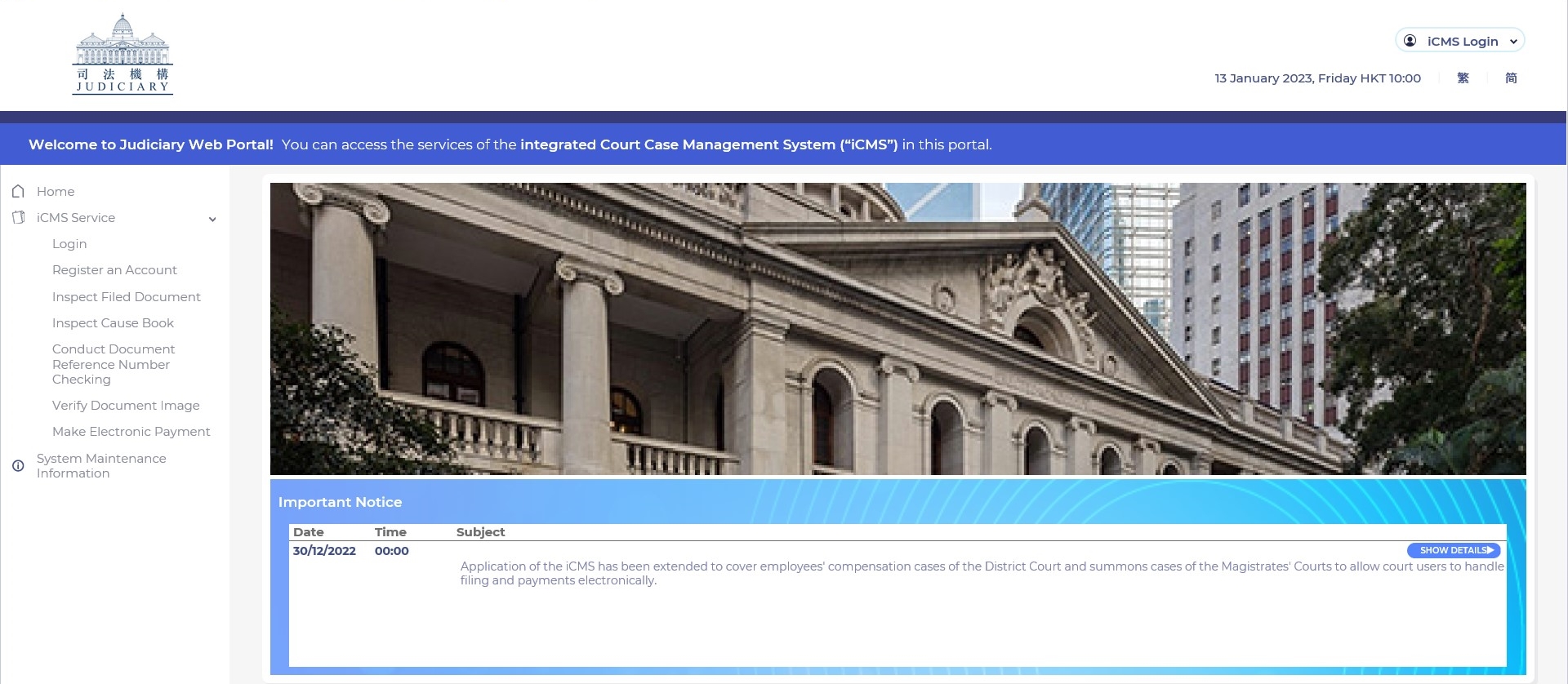 Integrated Court Case Management System in Judiciary Web Portal
Integrated Court Case Management System in Judiciary Web Portal To tie in with the implementation of the ITSP, the Judiciary has been trying out e-bundle hearings for suitable District Court civil cases since December 2020 and implemented a new Practice Direction on the use of e-bundles for commercial cases of the Court of First Instance of the High Court since May 2022. The feedback from users has so far been positive. Taking into account operational experience, the Judiciary will see how best to encourage more e-bundle hearings in the near future.
The Judiciary has been promoting the use of more remote hearings for civil proceedings since April 2020. So far, over 1 600 remote hearings (including video-conferencing and phone hearings) have been conducted and the experience has been positive. For criminal proceedings, to remove the legal impediments to remote hearings, the Judiciary has been working on a draft Courts (Remote Hearing) Bill to provide the court with the flexibility to order remote hearings as it sees fit, having regard to all relevant circumstances, as well as the dual requirements of open justice and fairness. We launched a three-month public consultation on the draft Bill in June 2022 and aim to introduce the Bill into the Legislative Council in 2023.
►Streamlining procedures for family-related proceedings
The Judiciary has been preparing for the introduction of the Family Procedure Bill, which will provide the legal basis for making a consolidated set of self-contained and streamlined procedural rules with a view to making the family justice system more efficient, cost-effective and user-friendly. We conducted a public consultation exercise in early 2022 and received a very positive response. We aim at introducing the Bill into the Legislative Council in 2023.
►Mutual legal assistance arrangements with the Mainland
Pursuant to Article 95 of the Basic Law, the HKSAR has so far signed nine arrangements with the Mainland on mutual legal assistance in civil, commercial and arbitral matters. As the “Arrangement on Reciprocal Recognition and Enforcement of Civil Judgments in Matrimonial and Family Cases by the Courts of the Mainland and of the Hong Kong Special Administrative Region” came into force in February 2022, the Judiciary promulgated a Guidance Note (PDSL 10.5) on Reciprocal Recognition and Enforcement of Mainland Judgments in Matrimonial and Family Cases to cover procedural matters. Separately, the Mainland Judgments in Civil and Commercial Matters (Reciprocal Enforcement) Bill was passed by the Legislative Council in October 2022 to give effect to the “Arrangement on Reciprocal Recognition and Enforcement of Judgments in Civil and Commercial Matters by the Courts of the Mainland and of the Hong Kong Special Administrative Region”. The Judiciary will continue to work with the Government in the preparatory work for implementation of the arrangement.

